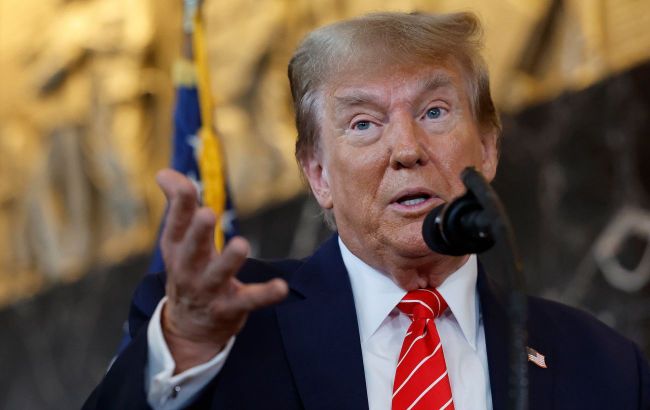Trump on Ukraine and Zelenskyy: Key remarks and changes in rhetoric over 10 years
 Donald Trump (photo: Getty Images)
Donald Trump (photo: Getty Images)
Today, Donald Trump will become the President of the United States for the second time. His actions in office will soon have a significant impact on the course of the Russia-Ukraine war and its potential resolution.
RBC-Ukraine examines how Trump's views on relations with Ukraine and its leadership have changed during his political career.
Contents:
Trump's first term
Trump had interactions with Ukraine's leadership during his first presidential term from 2017 to 2021. However, during the 2016 election campaign, he openly stated that he was not interested in Ukraine.
"I wouldn’t care. If Ukraine goes in ( joins NATO - ed.), great. If it doesn’t go in, great," Trump said in the summer of 2016 when asked about his support for Ukraine’s NATO integration.
Under heavy criticism, Trump later adjusted his stance and even spoke at the Yalta European Strategy Forum, acknowledging that Ukraine was not receiving the international support it deserved.
"My feeling with respect on Ukraine is that people have to band together from other parts of Europe to help. I don't think that Ukraine is given proper respect from other parts of Europe and it deserves it. Ukraine isn't getting the support that it needs and the United States has been supportive only verbally," he stated.
During Trump’s first presidency, relations with Ukraine were not a priority for the US. On one hand, the new President spent considerable time navigating the complexities of American domestic politics. On the other hand, he had other priorities: China, the European Union, Iran, and North Korea.
Nevertheless, Trump became the first US President to provide Ukraine with lethal weapons, including sniper rifles, Javelins, and radars.
Trump's impeachment and Zelenskyy
Attention on Ukraine in the US surged in 2019 during the impeachment proceedings against Donald Trump, initiated by Democratic Party members in Congress. In July 2019, Trump had a phone call with newly elected Ukrainian President Volodymyr Zelenskyy. During the call, Trump allegedly asked Zelenskyy to intensify investigations into Hunter Biden, the son of Joe Biden, who was Trump's election rival at the time.
Trump faced accusations of abuse of power and pressuring the Ukrainian President to influence the upcoming US election.
During these events, Zelenskyy maintained a neutral stance and denied being pressured by Trump. While Trump managed to retain his presidency, many reports suggest he harbored deep resentment toward Ukraine and Zelenskyy personally, believing they were the source of his prolonged troubles.
Years later, however, Trump praised Zelenskyy’s actions during that situation.
"He (Zelenskyy - ed.) said President Trump did absolutely nothing wrong. He said it very loud and clear. And the impeachment hawks died right there. He could have said, 'I don't know'. But he was... like a piece of steel, he said: 'President Trump did nothing wrong,'" Trump remarked ahead of his meeting with Zelenskyy on September 27, 2024.
2024 presidential campaign
During last year’s campaign, Donald Trump made numerous statements about Ukraine, though they were often vague. His main focus was criticizing President Joe Biden’s policies, frequently using Ukraine as a talking point rather than a central issue.
In a June debate with Biden, Trump claimed that Vladimir Putin launched the full-scale invasion of Ukraine because he didn’t respect Biden, who showed weakness during the chaotic withdrawal of US forces from Afghanistan.
“it was such a horrible embarrassment, most embarrassing moment in the history of our country. When Putin saw that, he said, you know what? I think we’re going to go in,’” Trump remarked. He also asserted that if he had been president, the invasion would never have happened - a claim he repeated at every opportunity.
Another prominent aspect of Trump’s rhetoric was his criticism of US aid to Ukraine. He argued that funds should be redirected to domestic priorities and suggested offering Ukraine loans rather than direct financial assistance. Additionally, Trump called for European countries to bear a greater share of the financial burden for supporting Ukraine.
Perhaps Trump’s most notable statement about Ukraine was his promise to end the war within 24 hours.
“On the evening of Nov. 5th, I will call Putin. I will call Zelenskyy. I’ll say, "We got to stop it." He vowed to make a deal in 24 hours.
As the election drew closer, Trump adjusted his rhetoric slightly. Initially, he pledged to end the Russia-Ukraine war very quickly. However, after winning the presidency, he avoided setting concrete deadlines. Trump admitted that ending the war would be more challenging than resolving the conflict between Hamas and Israel in the Middle East.
“I think, actually, more difficult is going to be the Russia-Ukraine situation. I see that as more difficult,” Trump said during a December press conference while discussing the Gaza conflict.
Trump also hinted at potential strategies for dealing with Kyiv and Moscow. He threatened Putin with measures to drive oil prices down to $40 per barrel and suggested to Zelenskyy that US military aid to Ukraine could be halted under his administration.
However, as detailed by RBC-Ukraine, Trump’s team currently lacks a clear plan for ending the Russia-Ukraine war.
Sources: material by CNN, Axios, BBC and Reuters.

